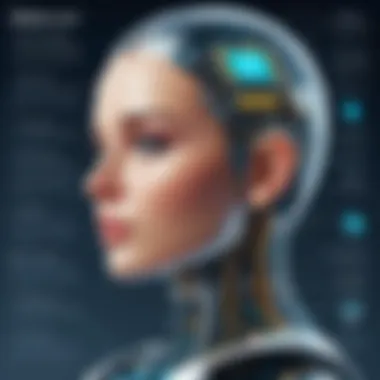AI Coding Assistants: A Comprehensive Analysis


Intro
In the ever-shifting landscape of technology, especially when it comes to software development, the introduction of AI coding assistants marks a significant milestone. The way developers collaborate with machines to write code is transforming, sparking both excitement and concern among professionals in the field. These tools aim to aid coders by providing instant support, troubleshooting, and even generating snippets of code, effectively cutting down time spent on mundane tasks. But what does this mean for the future of programming?
As we dissect the nuances of AI coding assistants, it’s crucial to understand that these are not just fancy gadgets; they’re actively reshaping the very fabric of how software is conceived, built, and maintained. This discussion invites tech enthusiasts, developers, and IT professionals to get a grasp on how these tools work, their potential advantages, and the ethical dilemmas they entail.
Prologue to AI Coding Assistants
In the ever-evolving world of technology, the role of AI coding assistants is becoming increasingly significant. These tools are not just fancy gadgets; they are shaping the way software is developed, optimizing workflows, and impacting the day-to-day lives of programmers. Their introduction hints at a monumental shift in how coding is approached, granting developers the ability to focus on higher-order tasks rather than getting bogged down by the minutiae of syntax and errors.
AI coding assistants come equipped with a plethora of features—from code completion and debugging support to intelligent suggestions that enhance programming skills. While their aim is to make life easier for developers, the implications of this technology go beyond mere convenience. It stirs up discussions on efficiency, skill development, and even ethics related to the increasingly automated landscape of coding.
Defining AI Coding Assistants
AI coding assistants can be simply thought of as software tools that leverage artificial intelligence to aid programmers in writing code. They function as intelligent partners rather than just traditional tools. This assistance can take various forms:
- Code Completion: Predicting the next lines of code based on the context.
- Error Detection: Identifying potential issues before they become problems.
- Automated Suggestions: Recommending best practices or alternative approaches.
These tools are designed to enhance productivity by providing real-time support during the coding process. Ideally, they help bridge the gap between knowledge and execution, allowing developers to write more efficiently.
Historical Context of AI in Software Development
The journey of AI in software development is steeped in a rich history that spans decades. As early as the 1950s, researchers began exploring ways to automate computation and create programs that could learn and adapt. Fast forward to the 1980s and 1990s, and we saw the introduction of early programming environments that utilized basic AI principles, albeit at a very rudimentary level.
However, the real game-changer came with the advent of machine learning and deep learning in the 2000s. These technologies provided new dimensions to AI, allowing for more sophisticated interactions within coding environments. Developers and researchers began to realize the potential of AI to assist in programming, leading to the development of more complex AI coding assistants that we see today. Increasingly powerful models have emerged, trained on vast amounts of data, enabling these tools to understand and predict coding patterns with remarkable accuracy.
This historical context is vital for understanding where the technology stands today and anticipating where it might go. As we delve deeper into the functionality, advantages, and future implications of AI coding assistants in the subsequent sections of this article, it’s clear that we are at a pivotal moment in the intersection of artificial intelligence and software development.
Types of AI Coding Assistants
The landscape of software development is changing quicker than a cat on a hot tin roof, and at the heart of this transformation are AI coding assistants. These tools assist programmers by simplifying coding tasks, minimizing errors, and enhancing overall productivity. Understanding the different types of AI coding assistants is crucial, as each type addresses specific needs in the coding process. This section will dissect the primary classifications of coding assistants: code completion tools, error detection and debugging assistance, and automated code generation.
Code Completion Tools
One of the standout features of modern integrated development environments (IDEs) is undoubtedly code completion tools. Picture yourself deep in writing a piece of code, and suddenly, you find yourself grappling with remembering the exact syntax or function names. That’s when code completion swoops in like a superhero. These tools leverage machine learning to suggest completions and even predict the next segment of code based on context. They help speed up the coding process, enabling developers to focus on the logic and structure instead of minutiae.
For instance, Visual Studio IntelliCode stands out for its ability to learn from your coding habits and adapt its suggestions accordingly. Not only does this specific tool offer autocomplete features, but it also learns from the best practices in the community, providing suggestions that even seasoned developers may overlook. In short, it’s like having a personal tutor watching your back.
Compared to traditional code editors, these tools can save developers a significant chunk of time, thus cutting down on that "scratching-the-head" while staring at the screen syndrome.
Error Detection and Debugging Assistance
Now, let’s shift gears to error detection and debugging assistance. The coding process can often feel like finding your way through a maze—errors pop up like unexpected potholes on a smooth road. Here, AI-driven tools take the role of a vigilant co-pilot, catching errors in real-time before they escalate into significant issues.
Tools like Sentry are built to intercept errors as they occur when the code is running. These applications provide immediate feedback, pointing out problematic lines of code while offering possible solutions. This proactive approach parallels having a seasoned developer constantly reviewing your work; you catch errors before they can create chaos.


Moreover, debugging tools can analyze coding patterns and learn from them. This means that over time, they might catch similar errors more efficiently, highlighting their potential to not just fix issues but also to teach developers about their own coding habits.
Automated Code Generation
Finally, we have automated code generation, a fascinating area that stands at the intersection of creativity and programming. With advancements in natural language processing, tools like OpenAI Codex are making it possible for developers to input plain English commands and receive fully functional code snippets in return. It’s a bit like having a genie in a lamp—just without the three-wish restriction!
Automated code generation helps bridge the gap between non-technical stakeholders and developers. For example, a project manager might describe a desired functionality in plain language, and by leveraging these tools, developers can quickly generate the necessary code. In a fast-paced development environment, this capability can significantly shorten the time from concept to implementation, making it particularly valuable for startups and teams racing against the clock.
"With great power comes great responsibility"—and the rise of AI coding assistants is no exception. Using these tools wisely can amplify productivity without compromising code quality.
Practical Applications of AI Coding Assistants
The integration of AI coding assistants into daily programming tasks has revolutionized how software development unfolds. Not only do these systems enhance productivity, but they also cater to a myriad of practical applications that streamline workflows, improve collaboration, and foster a richer learning environment for aspiring developers. Understanding these practical applications is vital for tech professionals, as it reveals the tangible advantages of leveraging AI within their coding practices.
Integration in Development Environments
AI coding assistants are often embedded directly into Integrated Development Environments (IDEs), allowing developers to access intelligent suggestions and functionalities within their familiar settings. This seamless integration means that programmers can benefit from features like real-time code completion, syntax highlighting, and even automatic formatting, all without needing to switch contexts.
Take Visual Studio Code, for instance. By using extensions like GitHub Copilot, users can receive tailored suggestions based on the context of their current project. This not only saves time but also reduces the cognitive load associated with remembering intricate syntax or coding conventions. When coding feels more intuitive, developers can flow into problem-solving rather than getting bogged down by minor details.
"AI coding assistants can turn your average IDE into a powerhouse of efficiency, shaping a more productive coding landscape."
Enhancing Collaborative Coding
In the realm of collaborative development, the importance of AI coding assistants cannot be overstated. These tools facilitate shared code reviews and discussions among teams. With platforms that utilize AI, such as pair programming tools, collaborators can receive real-time feedback on code contributions, thus enhancing synergy in teamwork. The ability of AI to analyze multiple code contributions together means less time spent on back-and-forth messaging and more time on creating effective solutions.
Additionally, even geographic distance ceases to be a limiting factor. Developers in different parts of the world can work on the same piece of code and receive suggestions and corrections simultaneously. This real-time interaction fosters a rich collaborative environment that transforms the way teams approach problem-solving and innovation in coding projects.
Supporting Education and Learning
Beyond professional coding environments, AI coding assistants play a significant role in educational setups. As students and novice coders engage with programming languages, these tools can offer instant feedback, code examples, and even tutorials that adapt to the learner's pace. Learning platforms such as Codecademy utilize AI to provide personalized coding exercises, adjusting difficulty levels based on real-time performance.
Furthermore, AI coding assistants also serve as intelligent tutors, available 24/7. They can answer questions, clarify coding concepts, or suggest best practices, making them invaluable in bridging gaps in understanding. Instead of relying solely on textbooks or formal classes, learners can explore coding languages at their own convenience, transforming the learning experience into something dynamic and responsive.
In summary, the practical applications of AI coding assistants extend across numerous facets of software development. By integrating these tools into development environments, enhancing collaborative efforts, and supporting educational initiatives, both seasoned developers and novices can tap into the potential of artificial intelligence to improve coding practices and outcomes.
Impact on Software Development Processes
The integration of AI coding assistants into software development processes is transforming how developers, teams, and organizations function in their daily operations. Understanding this impact is not just a passing fancy, but a crucial element that speaks to the future of coding and the workflow dynamics in tech. It offers insights into a realm where intelligence—both artificial and human—collaborates seamlessly, enhancing productivity and allowing innovation to take center stage.
Improving Efficiency and Productivity
The sheer effectiveness of AI coding assistants in boosting efficiency is hard to overlook. These tools provide developers with the capability to generate code snippets quickly, thus significantly speeding up the coding process. When faced with repetitive tasks, AI assists by offering relevant suggestions that can be implemented swiftly, allowing developers to focus on the more complex aspects of their projects.
For example, take a situation where a developer is working on a web application that includes a login interface. Instead of crafting the entire authentication logic from scratch, an assistant could suggest commonly used code blocks or relevant libraries. This not only cuts down on the time taken to complete the task but also reduces the cognitive load on the developer, allowing them to allocate more brainpower to innovative solutions and design.
Here are some additional ways AI assists in enhancing productivity:


- Auto-completion: Proposes relevant code completions as the developer types, speeding up the writing process.
- Real-time Suggestions: Offers context-aware recommendations while working, helping to reduce time spent searching for solutions.
The endgame? Projects stagnate less, deadlines become more manageable, and the door to creativity swings wide open.
Reduction of Human Error
Human errors in coding can lead to significant setbacks, extending timelines and inflating project budgets. In this landscape, AI coding assistants emerge as a valuable ally. These tools offer real-time error detection and suggestions for corrections, catching mistakes before they spiral into larger issues. Whether it’s a misplaced semicolon or a logic flaw, AI can help highlight vulnerabilities that might escape human attention.
For instance, consider the scenario where a junior developer is learning to code. While they craft their first function, an AI assistant can alert them to syntax errors or suggest more efficient code patterns, providing not just corrections but education as well.
In a broader view, the advantages of AI in minimizing human error include:
- Continuous Learning: As the AI analyzes more data, its recognition patterns improve, which leads to fewer mistakes over time.
- Testing Support: Code reviews and testing become more thorough, since AI can recommend specific test cases based on the code structure.
Reducing the margin for error closes the loop on quality assurance and streamlines the development lifecycle.
Augmenting Developer Skills
AI coding assistants are not here to replace developers; rather, they are tools designed to augment and elevate the skill set of individuals in the tech space. These assistants help junior developers grow while simultaneously supporting seasoned professionals. By providing instant feedback and recommendations, they enrich the learning process.
For example, when a new hire navigates through their first major project, an AI tool can walk them through complex programming paradigms, providing insights that they might not have encountered yet. Over time, as they interact more with these tools, their coding skills improve, leading to a more competent workforce.
Key takeaways of skill augmentation through AI coding assistants include:
- Skill Development: Opportunities for upskilling with exposure to best practices in coding.
- Mentorship Functionality: Acts as a mentor, guiding less experienced developers through challenges and enhancing their thought processes.
"The future of software development isn't just about what we create, but how we create it. AI is the lens through which we view that future."
Understanding these elements is essential for tech professionals looking to stay ahead in an ever-competitive landscape. The landscape of software development is shifting, and recognizing the impact of AI coding assistants is paramount.
Limitations and Challenges
AI coding assistants are a double-edged sword in the world of software development. While they bring numerous benefits, it's essential to recognize their limitations and the challenges they pose. These factors are not just trivial considerations; they shape how developers interact with these tools and influence the overall efficacy of AI in coding. Understanding the constraints of AI coding assistants can lead to more informed decisions on how to best utilize them while navigating their shortcomings.
Dependence on Machine Learning Models
One of the primary limitations of AI coding assistants is their heavy reliance on machine learning models. These models analyze vast amounts of data to generate suggestions. However, the effectiveness of these suggestions hinges on the quality of the underlying data. If the training data contains biases or inaccuracies, the tool's recommendations may suffer from the same flaws. Furthermore, the constantly evolving nature of programming languages and frameworks means that models require regular updates to maintain their relevance. This dependency can lead to a lack of adaptability in dynamic development environments, limiting a developer's ability to innovate. More than once, developers have found themselves grappling with suggestions that are outdated or not suited for their specific use case, leading to frustration and inefficiency.
Quality of Suggestions and Recommendations
Ideally, AI coding assistants should enhance productivity by providing high-quality suggestions. Yet, the reality is often different. Variability in the quality of suggestions can be a thorn in the side of developers. Some assistants may struggle to understand context, offering irrelevant or nonsensical recommendations when faced with complex code structures. For instance, a coding assistant might suggest a library that performs a function entirely different from what the developer needs. Moreover, the confidence level of suggestions can create a false sense of security. A developer, blinded by the advanced capabilities of these tools, might neglect critical thinking or thorough reviews of the proposed code changes. This scenario highlights a troubling pitfall: reliance on AI can sometimes derail the crucial human element in software development, which hinges on creativity and nuanced understanding.
Ethical Considerations
As AI coding assistants grow more prevalent, ethical concerns surrounding their application loom large. The specter of intellectual property theft rears its head, as the coding assistants might generate code snippets that inadvertently echo or replicate proprietary work. This raises questions about ownership and credit in a landscape where code is vital. Additionally, the automated nature of these tools may inadvertently sideline junior developers or less experienced programmers who rely on these technologies for learning. Their growth could stymie as AI solutions take over the task of coding, leaving little room for hands-on experience. A careful balance must be struck to ensure that while developers benefit from AI assistance, they are not robbed of opportunities that nurture their skills and creativity.


"As we forge ahead into a landscape dominated by AI, it is crucial to scrutinize the implications of these technologies, ensuring we strike a balance between harnessing their power and maintaining rigorous ethical standards."
In summary, acknowledging the limitations and challenges of AI coding assistants is vital for developers and organizations alike. Awareness fosters critical engagement, ensuring that these tools complement rather than overshadow human intellect and creativity. By recognizing their dependencies on machine learning models, grappling with the quality of their suggestions, and weighing ethical considerations, the tech community can leverage AI coding assistants more effectively and responsibly.
Future of AI Coding Assistants
The landscape of software development is rapidly evolving, and at the forefront of this transformation are AI coding assistants. These tools not only streamline coding processes but also redefine the role of developers in myriad ways. Understanding the future of these assistants is crucial for anyone involved in tech today—whether you're a seasoned programmer or just dipping your toes into software development.
As we consider the future, it’s clear that advancements in AI technology are paramount. Innovations in machine learning algorithms and natural language processing will lead to even more sophisticated coding tools that can predict a developer's next move with increasing accuracy. This not only helps accelerate the coding process but also facilitates a smoother workflow, allowing for quicker deployment of projects.
Evolving Technologies and Innovations
The algorithms behind AI coding assistants are not static; they evolve. New technologies are constantly being developed to enhance these systems. For example, advanced neural networks and deep learning techniques are on the rise, improving the capability of coding assistants to provide context-aware suggestions. This means that rather than merely offering code snippets, these assistants might understand the functional requirements and make recommendations that integrate seamlessly with the project.
- Natural Language Processing (NLP): NLP allows these tools to better understand user requests, reducing the gap between human communication and machine interpretation.
- Predictive Analytics: By analyzing prior coding patterns, assistants can suggest the next best lines of code.
- Visual Programming Interfaces: Some future tools might even leverage visual programming, allowing for drag-and-drop functionalities that could further minimize the barriers for less experienced developers.
In essence, these innovations will continue to enrich user experiences and solidify the role of AI as an indispensable partner in coding.
Potential Market Growth
The market for AI coding assistants is ripe with potential growth. As software applications proliferate across various industries—from healthcare to finance—there's a pressing need for efficient coding solutions. Businesses are constantly on the hunt for tools that can help their developers code better, faster, and with fewer errors.
Consider this:
- The demand for AI-driven tools is projected to grow significantly over the next few years, with reports suggesting a compound annual growth rate (CAGR) of xx% in the software development AI segment.
- Companies are realizing that investing in AI coding assistants not only enhances productivity but can also lead to substantial cost savings.
It's no surprise that many tech giants are pouring resources into developing their own coding assistants and improving existing models. This interest indicates strong confidence in the viability of the market, effectively creating a robust ecosystem for innovation and development.
Integration with Emerging Technologies
AI coding assistants are not just standalone tools; they are increasingly being integrated with emerging technologies. For instance, cloud computing platforms like Amazon Web Services and Microsoft Azure are gradually incorporating AI capabilities into their frameworks, providing developers with powerful tools that enhance collaboration and efficiency.
Moreover, AI coding assistants are connecting with concepts like quantum computing and edge computing. This convergence can lead to innovative solutions that are more efficient and adaptable to diverse needs in the software realm. The potential for these integrations is vast, allowing coding assistants to become even more versatile, assisting developers from ideation to deployment.
"The future of coding will not merely be about lines of code but about collaborating with intelligent systems that can learn, adapt, and grow alongside developers."
In summary, the future of AI coding assistants holds incredible promise, driven by evolving technologies, considerable market growth, and seamless integration with emerging innovations. For developers, this means not only improved efficiency but also new possibilities for creativity and problem-solving in the coding landscape.
End
The conclusion of this article encapsulates the intricate relationship between AI coding assistants and software development. It reiterates how these tools are not just supplemental resources but can be pivotal in transforming coding practices across various industries. For software developers, IT professionals, and tech enthusiasts, understanding the implications of AI coding assistants is vital, as these tools can significantly enhance productivity and efficiency in coding tasks.
Recap of Key Insights
Throughout the exploration of AI coding assistants, we touched upon several critical aspects that highlight their value. From code completion tools to their ability to detect errors, these assistants are designed to streamline the coding process. Here are some key insights that emerged:
- Efficiency: AI-driven platforms can automate repetitive tasks, delivering code snippets and suggestions, which save time.
- Error Reduction: With advanced debugging features, these tools help catch mistakes before they escalate into larger problems.
- Learning Support: New developers benefit from integrated educational resources that help them grasp concepts quickly.
- Ethical Considerations: Deploying these technologies raises important discussions about data privacy and intellectual property, which are vital for responsible usage.
- Future Potential: The ongoing evolution of AI technologies suggests that their integration will only deepen, affecting how we think about software development in the future.
The Way Forward
Looking ahead, the path for AI coding assistants appears promising yet filled with challenges. To navigate this landscape, various stakeholders—developers, organizations, and policymakers—must consider several factors:
- Embracing Change: Developers should be open to incorporating these tools into their workflows, understanding that they can complement rather than replace human creativity and problem-solving skills.
- Continuous Learning: As AI coding assistants evolve, so too should the skill sets of those who use them. Emphasizing a culture of lifelong learning will be crucial.
- Investing in Innovation: Organizations should prioritize research and development in AI technologies to ensure they remain competitive.
- Addressing Ethical Challenges: Developers and organizations must work collaboratively to set guidelines that promote ethical AI use, ensuring transparency and fairness in these systems.



